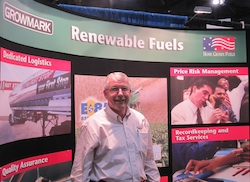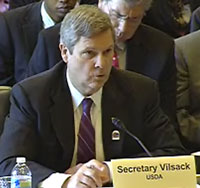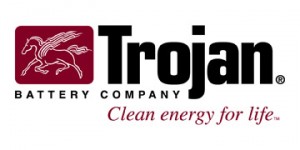Considering Republication opposition to ethanol initiatives in the House Continuing Resolution, some ethanol producers are taking to Capitol Hill for face-to-face discussions with their lawmakers about the importance of ethanol to the country.
 Two representatives from Marquis Energy of Hennepin, Illinois were in Washington, D.C. this week for personal meetings with representatives from their state, including Robert Schilling (R-17), Aaron Schock (R-18), Randy Hultgren (R-14), John Shimkus (R-19) and Adam Kinzinger (R-11). Mark Marquis, President of Marquis Energy (left), is pictured meeting with Rep. Schock in this photo provided by Growth Energy, of which Marquis Energy is a member.
Two representatives from Marquis Energy of Hennepin, Illinois were in Washington, D.C. this week for personal meetings with representatives from their state, including Robert Schilling (R-17), Aaron Schock (R-18), Randy Hultgren (R-14), John Shimkus (R-19) and Adam Kinzinger (R-11). Mark Marquis, President of Marquis Energy (left), is pictured meeting with Rep. Schock in this photo provided by Growth Energy, of which Marquis Energy is a member.
“These meetings present us with a unique opportunity to speak candidly with our policy makers about the benefits of homegrown ethanol,” said Marquis. “These benefits include reduced emissions, stronger national security and job creation not only in Hennepin, but throughout the state of Illinois and across the country.”
Marquis says his meetings with lawmakers included discussion about Growth Energy’s Fueling Freedom proposal to develop the infrastructure to deliver ethanol to consumers. “By reforming the market for alternative fuels, ethanol can strengthen the Illinois economy and clean its environment.”





 Vilsack told the committee that the farm economy continues to remain strong with U.S. agricultural exports, farm cash receipts and net farm income projected at or above previous record levels. “With biofuel demand expected to continue growing, although at a slower pace in the future, a big challenge will be responding to that demand by developing new feedstocks, producing on more acres, and producing more per acre while protecting the environment,” he said. “I have the utmost confidence that our farmers and ranchers along with the assistance of USDA will be able to meet these challenges.”
Vilsack told the committee that the farm economy continues to remain strong with U.S. agricultural exports, farm cash receipts and net farm income projected at or above previous record levels. “With biofuel demand expected to continue growing, although at a slower pace in the future, a big challenge will be responding to that demand by developing new feedstocks, producing on more acres, and producing more per acre while protecting the environment,” he said. “I have the utmost confidence that our farmers and ranchers along with the assistance of USDA will be able to meet these challenges.”
 The
The 



